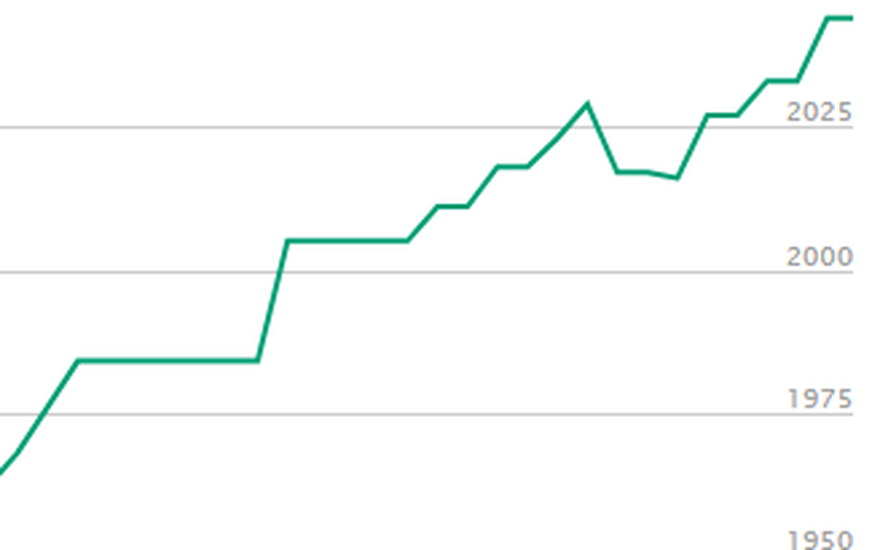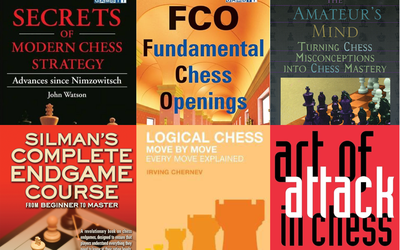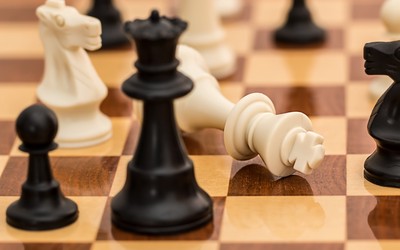
How I broke out of my plateau and gained 90 points in a month
For two years I had been stuck at 2000 - how did I break this rating ceiling?Chess is fun when you're winning, but what happens when you stop?
When I started playing chess regularly in March 2020, I made rapid progress and my rating soared from 1350 to 1900 in less than a year. Progress slowed after that and it wasn't until October 2021 that I hit 2000. Two years later I was stuck at the same level. It seemed like I had hit a plateau and had reached a skill ceiling. Was this as good I would be at chess and no better?
One reason I didn't believe I had reached my peak was the fact that I was making massive improvement in over-the-board chess. This year alone, I have gained 400 points and have had some fantastic results against much higher rated opponents. In OTB games I have been able to find clever tactics and winning strategies in positions where an online player might offer a draw.
So how could I convert my over-the-board progress to online chess?

My rapid rating hovered around 2000 between June to October 2022.
I examined the chart of my progress and found a very consistent pattern. My rating would steadily increase by 5-10 points every day for about 2 weeks before suddenly plummeting down by around 50 points in the space of only 2-3 days.

My rapid rating from April to June 2023. Everytime I tried to progress above 2000, I would sharply fall off a cliff
Was there some way I could focus on the habits that lead to the rise while avoiding those that lead to the fall?
Treat every game as if it were an OTB tournament game
It's interesting to compare the difference between playing online chess and playing in an over-the-board tournament. People often ask what their FIDE rating would be based on their online rating, but this is asking how long would it take to run a marathon based on how long it takes to sprint 100m. In online chess, I'll make a move if it seems good enough or might lead to a better position. But in OTB chess, I put huge effort into making sure that every move is the absolute best.
If I'm playing a tournament game and have a plan that takes 2 or 3 moves to carry out, I might reject it as being too slow. Something that takes that long will probably be blocked by my opponent before it can reach fruition. Instead I'll look for a more forcing move, something that gives me tempo and might carry multiple threats, so if one is blocked, the others may succeed. Compare this to online chess, where frequently I will make a move that looks good, only to have my opponent block my plan and leave me without a way to advance.
So what if I brought this level of focus to my online games? What if instead of just moving pieces for fun, I treated every move as if it was vital to find the best strategy? Obviously, you can never spend as much time in online game as in a 90+30 OTB game, but you can still have a focused mindset that treats every game as important as if it were FIDE-rated. I almost exclusively play 10+5 because it gives me more time to think than in blitz and the increment means I rarely lose on time.
Play only 1-2 games per day
Another way to treat your games as if they were a OTB tournament is to limit yourself to only one or two games per day. You should only play when you feel fresh and energised. One game may not should like much but a single 10+5 game can often last 30 minutes and it is hard to maintain full concentration for more than an hour. I notice that I play my best chess in my first hour, after that my concentration fades and after two hours I get sloppy.
It's very tempting to hit the new game button after a game ends, especially if you lost and feel you need to bounce back. However, resist the urge and instead take a few minutes to analyse your game and see where you can improve. I firmly believe that most chess improvement comes not from expensive books, coaches or courses, but from analysing every game you play.
After a loss, it is common to want to move on and play a new game so you don't have to think about the last game. However, I think it's beneficial to dwell on your games. Often hours later I will still think about a Bishop move I made or a tactic that changed the fate of the game. If you know you can't reset and start a new game, then you will give your all to this one game.
Separate the serious chess from the fun chess
If the idea of playing only 1 or 2 chess games per day seems too limiting, then seperate your chess into serious and fun. Play one serious game where you concentrate fully and then afterwards just play for fun in a time control where you don't care about your rating. You could even have an account on a different website that's just for when you're too tired for your main account.
In my case, I don't care about my blitz rating. When I play blitz, I feel I don't have enough time to properly consider my moves, instead I'm mostly playing on instinct. So, it doesn't bother me that my blitz rating is 200 points lower than my rapid. In fact, I've embraced this and treat blitz as my "fun" chess and rapid as my "serious" chess.
This means whenever I play rapid, I give it my 100% and strive to improve my rating. But blitz is when I'm feeling tired or want a break from rapid chess. I also use blitz to be experimental and try out new openings and take risks I wouldn't otherwise take. I also play Chess 960 when I want a break from standard chess and opening theory.
Know when to walk away
Improving my rating often felt like gambling. The wins bring a high and the losses a crushing low. It's also tempting to play just one more game, just one more. But as mentioned above, only play when you're fresh and focused and after an hour or two, I feel my concentration slipping (especially if I'd been working that day).
Many times I've started the day with some wins, but then my luck runs out and I start losing. Then I feel the urge to win back the rating points I've lost, which causes me to lose even more. The more I lose, the more frustrated and annoyed I become, which makes me play worse, which makes me lose more. This is the main reason why my declines were so sharp and steep, I was too focused on winning back my lost points and frustrated by my losses that I couldn't focus on the game and just kept losing.
This is why I walk away from the computer after about an hour, regardless of my results. If I'm winning, then I want to cash out and keep my Elo up before I get fatigued. If I'm losing, then I want to stop the slide and return the next day when I'm no longer frustrated.
Focus on the goal
When I first hit 2000, I internalised it as my natural state. I defined myself as a 2000 player. So when I lost, I just considered this a temporary setback that would soon be corrected. I refused to let myself rest at 1950 or 1970, because that was not where I belonged, I was clearly (in my mind at least) a 2000. This might arrogance or denial, but it worked. By having a clear goal (that was also a nice round figure), I could motivate myself to play better.
My rating went through several periods of clear upward progress because I was focused on my target. It also went through several sharp declines because I would take my foot off the pedal once I reached my target. To avoid this, I set a new target of beating my all-time high of 2033 and after I did, my target is now 2050.
Study
Every chess player is looking for that one magic book that will grant you hundreds of Elo. Unfortunately, I don't know what that is. I've started studying chess books in the last few months and I like them, but I have no idea how much of an impact they have had on my chess skill. The three books I've been reading are:
- The Amateur's Mind by Jeremy Silman
- Silman's Complete Endgame Course by Jeremy Silman
- Logical Chess: Move by Move by Irving Chernev
One habit that I feel does help, is that I study a chess book for about half an hour before I starting playing online. Not only does the study have some useful advice, but it also puts me in the right frame of mind. Instead of just moving pieces and hoping for the best, I'm thinking of concepts like imbalances, weaknesses, piece activity etc.
Even if I don't fully apply the principles or remember the exact details in my games, I find it very useful to slow down and think deeper about the position.
Luck
Look, I'll be honest with you, I didn't reach 2000 just because I'm an amazing player with a fantastic plan. I'll openly admit it: a lot of the time I got lucky. It's surprising that even at this level I've had games decided by players hanging pieces for free. I played a game where I fought tooth-and-nail to slowly grind my way to a better position and win a pawn - only to miss that my Rook was undefended, costing me the game.
Don't play tournaments
This is just my personal experience, but I find I play worse in tournaments than in individual games. I don't know why this is, perhaps because tournaments usually don't have increment or because I'm pressured to play as many games as I can before the hour is up. You might have a different experience, but for me, my rating climbed when I stopped playing in the Lichess tournaments.
It's worth analysing your games to see if there's some setting where you underperform. Even if it's not clear what prevents you from playing your best, it still might be a good idea to adjust your habits accordingly.
Result
So, taking all this in mind, I sat down with my plan and a determination to break the 2000 barrier and keep going. With a full-time job, I couldn't play every day but when I did, I made sure I was fresh and focused.
I began by studying a chess book for 30 minutes and used this as a warmup to get myself into the right state of mind. Then I would play a single game of 10+5 and treat it as if it were a game in a serious OTB tournament. I would look for the best move in every situation, instead of just settling for "good enough". This meant I was always at a time disadvantage but the increment meant I never lost on time. After the game, I would pore over every move with the engine and try to see ways to improve. If I had time, I would play another game but usually I only had an hour to spare, so that would be all for the day.

My strategy was a massive success. I went from 1954 on September 11th to 2044 on October 8th, not only reaching 2000, but also beating my all time high of 2033 (which I had set two years earlier). While my play wasn't perfect and I still lost games, I was playing at a far higher level. I noticed I made less blunders and was better able to create winning opportunities.
Although I can't guarantee success, I think you can also improve your rating by having the right focus and treating your games as if they were in a real life tournament.
More blog posts by TeoKajLibroj

Irish Chess Union gives massive rating boost to Irish chess players
How I gained 400 points without playing a game
6 chess books I tried to read
And which ones I would recommend
Has the chess boom reached OTB tournaments?
Have Irish tournaments experienced the chess boom?
